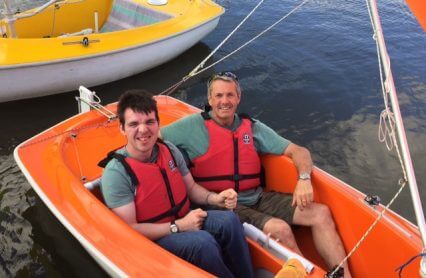Is silence golden?
By Martin Boniface
Last month, my son, Harry was excited to go to the theatre. Harry has severe learning disabilities, epilepsy and no speech, Harry loves animals and when his Dimensions support worker took him to see Into the Woods, a musical fairy tale, he was really enjoying the matinee performance. All the more because I was in the cast.
Harry expressed his enjoyment by making lots of sounds. When a cow appeared on stage, he would recognise it and would moo. When a wolf appeared, he would howl. He loved it.

Someone in front kept turning round and saying shush. Eventually the lady told Harry’s support worker that they should leave as “he was distracting and disrespecting the performers on stage”. The support worker did her best to explain the situation but the lady turned her back on them and eventually they felt obliged to leave.
Harry was really sad at the time and whilst I was incandescent with rage, both I and Harry’s support team will do our best to help put the incident behind us. Based on this experience, it is very easy to see why so many people with learning disabilities just want to stay indoors and hide.
There have been many similar incidents reported recently. A lady with Asperger’s Syndrome was forcibly ejected from a film for laughing too loudly. Another lady was asked to leave a pub after staff mistook her disability for being drunk.
You can argue that this is a good thing. Disabled people are increasingly going out in public, are less shuttered away in institutions out of the public eye. But of course, as this happens, as non-disabled people encounter those with disabilities more and more, there will be conflict. Anxiety on all sides will rise. We need to shine a light on this. We need to learn from those moments of conflict and find ways to ensure that everyone in society can rub along together ok, with minimal friction.
At the extreme end, this conflict amounts to hate crime and lobbies such as Dimensions’ #ImWithSam campaign are working to tackle this through making changes in schools, in the police and judicial systems, and with the public.
But what about the other end of the spectrum? How can we encourage people to question their own tolerances? How can we get people to think ‘might this person have a disability’ instead of ‘isn’t this person ill-behaved’? What can support teams do to help things along, and how should they react when things go wrong?
Working with Martin, Dimensions has put together a ‘top 10 (actually 11!) tips’ for avoiding, and dealing with, difficult moments in public. We would welcome your thoughts.
1. Plan what you’re going to see in terms of
venue, seat selection, subject matter, access,
likely audience profile etc. You know the person
you support. If you anticipate there could be a
problem, make a plan with the venue staff in
advance.
2. Prepare the person you support by visiting the
venue beforehand to get familiar with it, doing
social stories and where appropriate explaining
the social rules and unwritten expectations of the
event to give the person the best possible chance
of meeting them.
3. Where possible and appropriate, choose
matinee, relaxed or autism friendly
performances. These can be an end in
themselves, or can be a stepping stone to
attending conventional performances.
4. Contact local venues to ask how they ensure
safe access for people with learning disabilities.
Encourage them to consider advertising some
performances as ‘relaxed’ and have a policy on
what that means. Encourage them to be clear
about ‘welcoming audiences of all ages and
abilities’ via posters in foyers and online.
5. Ask venues how their staff are trained to deal
with incidents of this nature and how they would
respond to an incident or complaint. Don’t
assume untrained staff will get decisions right
in the heat of the moment. Dimensions offers
‘autism friendly’ staff training to help venues in
this area.
6. If a member of the public expresses concerns
about your loved one, explain the situation
calmly. Most people will be understanding.
Never give people anything else to complain
about.
7. You might consider carrying an ‘emergency
contact card’ with you – having something to
give to a concerned member of the public can
defuse the immediate situation and defer any
discussions to a later date.
8. If this fails then ask them to speak to staff at
the venue or failing that, you should contact a
member of staff to explain what is happening
and see if they can help.
9. If you do have to leave a venue then don’t
suffer in silence but also don’t make a stressful
situation worse for the person you’re supporting.
Either ask to see the person in charge and make
a formal complaint or failing that, write to them.
10. If all else fails, don’t underestimate the power of
the press and social media to make your voice
heard.
11. But… do empathise with that member of the
public. There is rarely an absolute right or wrong
in these situations. Social media witch hunts
don’t help anyone in the long run.
Above all, remember that we can only change people’s attitudes if we use our voice to help people understand that our loved ones also have the right to be entertained.
We would be interested to hear other stories like this, so please get in touch via
marketing@dimensions-uk.org.
We teamed up with cinema chains across the UK to provide inclusive and accessible cinema screenings to the public.
Read about our autism friendly cinema screenings throughout the country.



